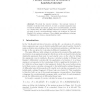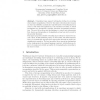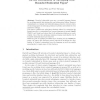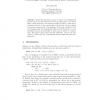114
click to vote
APLAS
2009
ACM
15 years 6 months ago
2009
ACM
Type and effect systems are a tool to analyse statically the behaviour of programs with effects. We present a proof based on the so called reducibility candidates that a suitable ...
APLAS
2009
ACM
15 years 6 months ago
2009
ACM
We study the resource calculus – the non-lazy version of Boudol’s λ-calculus with resources. In such a calculus arguments may be finitely available and mixed, giving rise to ...
106
click to vote
APLAS
2009
ACM
15 years 6 months ago
2009
ACM
In this paper we present polynomial time algorithms deciding branching bisimilarity between finite-state systems and several classes of infinite-state systems: BPA and normed BPP...
110
click to vote
APLAS
2009
ACM
15 years 8 months ago
2009
ACM
Ownership types support information hiding by providing object-based encapsulation. However the static restrictions they impose on object accessibility can limit the expressiveness...
APLAS
2009
ACM
15 years 8 months ago
2009
ACM
124
click to vote
APLAS
2009
ACM
15 years 8 months ago
2009
ACM
Bounded existential types are a powerful language feature ling partial data abstraction and information hiding. However, existentials do not mingle well with subtyping as found in ...
APLAS
2009
ACM
15 years 8 months ago
2009
ACM
When describing the resource usage of a program, it is usual to talk in asymptotic terms, such as the well-known “big O” notation, whereby we focus on the behaviour of the prog...
114
click to vote
APLAS
2009
ACM
15 years 8 months ago
2009
ACM
Restricting destructive update to values of a distinguished reference type prevents functions from being polymorphic in the mutability of their arguments. This restriction makes it...
APLAS
2009
ACM
15 years 8 months ago
2009
ACM
Handling concurrency using a shared memory and locks is tedious and error-prone. One solution is to use message passing instead. We study here a particular, contract-based flavor ...
102
click to vote
APLAS
2009
ACM
15 years 8 months ago
2009
ACM
We propose a method for easily developing efficient programs for finding optimal sequences, such as the maximum weighted sequence of a set of feasible ones. We formalize a way to ...





